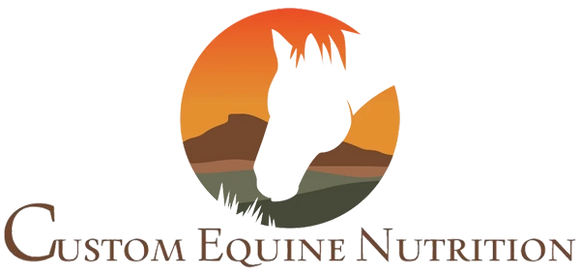Got Hives?
Nutritional causes of dermatological issues fall under two categories: Direct and Indirect.
Direct is caused by too much or too little nutrients or toxic nutrients. Indirect is a food allergy or food hypersensitivity.
Indirect (food allergies) are rare and there is little scientific data to support it. Insect bites are the most common allergic skin disorder. A common symptom of allergies is pruritus (fancy word for severe skin itching).

Skin allergies develop when an IgE reaction is triggered by irritants passing through the skin. They are hard to control once they develop as even the smallest exposure can set them off. It can take over a year for the body to build up enough antioxidants to fight off allergies. In the interim some horses may need steroids or antihistamines to stop the cycle.
Allergy Testing
Authors of the highly respected textbook Equine Applied and Clinical Nutrition are under the opinion that the use of serological and intradermal testing for food ingredients are not recommended as there is very limited scientific support for their procedure. Anecdotally, more owners have had success with intradermal testing than serological. The authors recommend the use of elimination diets instead.
The suggested approach is to relocate the horse to new surroundings, preferably away from home with new bedding. Stop all grain, supplements and obtain new hay. Clinical signs should disappear within 2-6 weeks. Once clinical signs have disappeared, slowly reintroduce one item at a time. Causative ingredients will provoke re-occurrence of clinical signs within 1-14 days.
Helpful Nutrition
A protective layer (barrier) is your horses first line of defense over insect stings and bites, nutritional support can help decrease your horses’ reactions. Barriers include fly sheets and insect repellant. Some horses can be predisposed by a strong genetic component.

Following is a list of nutrients that can help support your horse:
|
Nutrient |
Comments |
Feeding Solutions |
|
Minerals |
Avoid mineral deficiencies. Zinc deficiency can cause dry skin that is susceptible to infections. Magnesium will increase immune support and reduce allergic reactions. |
Test your hay and send the analysis to Uckele.com to have a custom mineral supplement formulated for your specific hay. If testing is not an option feed a forage balancer supplement formulated for your region such as Vermont Blend or California Trace Plus. |
|
Omega 3 Fatty Acids |
Immune support and anti-inflammatory effects. One study showed horses given large amounts of flax-seed (1 pound per 992lbs) experience lower allergic skin response to culicoides extract (sweet itch). |
Feed minimum per day: 4oz (by weight) of stabilized ground flax, or 4oz (by weight) of Chia Seeds, or 2oz of pure flax oil. Increase amounts as needed. Flax-seed can be increased to 1lb per day. |
|
Vitamin E |
Symptoms of deficiency include dry coat, allergic or hypersensitivity reactions, poor resistance to skin infections. Supports immune system |
Minimum 1000iu per 500lb of body weight. |
|
Protein |
Deficiency can cause dull coats that are slow to shed out or grow. |
Ensure your horse meets daily requirements, but avoid excess amounts. High protein levels can increase allergic responses. |
|
Chondroitin |
Anti-inflammatory |
2.5-5grams per 500lb of body weight twice a day. |
|
Vitamin A |
Deficiency is not common. Should be supplemented if hay is over a year old or bleached/yellow. |
20,000-40,000iu/day. |
|
Vitamin B |
Signs of deficiency include skin scaling or rashes, and thinning hair. |
Best to supplement the entire Vit. B group as they work together. |
There are a lot of supplements on the market that promise they will halt your horses’ allergies in its tracks. This is leading to a possible new risk by well intentioned owners; excess supplementation, mainly by creating mineral imbalances and toxicity.
Ensure your horse has the nutrients he needs but not in excess. Too much of a good thing can hurt your horse and your wallet.
Happy Feeding!
Custom Equine Nutrition
References and Additional Information:
Equine Applied and Clinical Nutrition, by Geor, Harris and Coenen
Equine Nutrition and Feeding, by David Frape
NRC 2007
The Horse’s Mouth, Aug. 2017
Horse Journal, Guide to Equine Supplements and Nutraceuticals, by Eleanor Kellon


